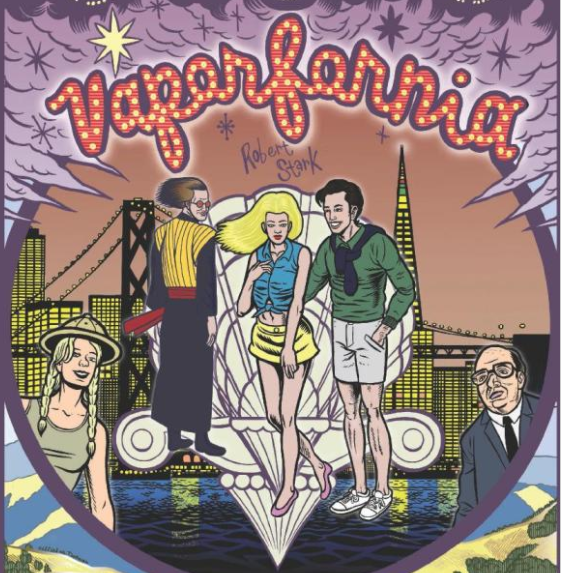Commoditizing the Starkian
For those who do not know, Stark Truth podcaster and
tireless self-promoter Robert Stark “is an American journalist and political
commentator. You can listen to his podcast at Doubleyou Doubleyou Doubleyou Dot
Stark Truth Radio Dot Com.” He is also something of a guerrilla litterateur,
and the publication of Vaporfornia, Stark’s sequel to 2017’s Journey to Vapor Island, constitutes an underground literary event. His
preoccupations in Vaporfornia, which focuses on a different protagonist but
elaborates on the world created in Journey (while also overlapping with
Matthew Pegas’s Dragon Day), will be familiar to Stark’s audience, with retrofuturism,
neon, Jewesses, anuses, incels, and California all zoned for ambitious
development in the author’s imagination. Stark’s new novel follows aspiring
reporter and social justice warrior Max von Mueller, a troubled young man torn
between defeatism and grandiose visions, woke ideology and the eugenic
revolutionism of utopia-dreaming billionaire presidential candidate Roger
Blackstone, an inspirational Daddy Warbucks figure to spiritually orphaned Max.
From the Bay Area to Modesto to Reno and back to Los Angeles, Max is propelled
on a neo-picaresque California incel odyssey that will test his social
commitment to the uplift of the downtrodden as well as his aesthetic integrity.
Max’s incomplete investment in wokeism provides Stark with
some of his fodder for parody, as in this memorable San Francisco scene:
Anyhow, I’m fascinated by the urban
grittiness and notice some older vintage neon signs which I quickly snap photos
of keeping an eye out for thieves. I see a sign and realize that this is the Tenderloin
which my parents have always warned me to avoid but it’s much more urban than
your typical ghetto.
The further I walk the sketchier
things become. I should really head back right after I get a photo of that
hotel blade sign. But wait. Right in front of my eyes is a transgendered
houseless person of color, presenting me with the opportunity to provide
assistance. I reach into my wallet but all I have is some change. Then I hand
her….. I mean them my change. Ze gives me a look of disappointment.
Furnishing the most formidable antagonism is sleazy entertainment
industry power player Ari Meschel, a grease-creature based on Harvey Weinstein.
Meschel has designs on two young women Max hopes to protect: naïve TV
personality Emma the Nature Girl and the elusive Natalie Bloom, a Stark obsession
reprised from Journey. Also haunting the hero’s divided psyche is incel
mass murderer Noam Metzenbaum, whose eerily parallel experience darkens Max’s
self-image and fills him with shame and horror. As in his first book, Stark’s
female characters are uninteresting husks – which is to say that he has
captured womanhood with a startling realism. In seriousness, the fact that inamorata
Natalie Bloom only appears for any duration when Max’s consciousness occupies
her body in fulfillment of a blatant latent homosexual fantasy indicates a
profound remoteness and alienation from the female sex, as does the recurrence
of cunnilingus and, more pungently, analingus as the only forms of physical intimacy
with a woman that Stark can countenance. No merely degrading pornographic
contrivance, however, the author’s nightmare invention of the “sex coffin” in
which a captive social outcast is confined and compelled to orally service affluent
women grotesquely visualizes dramatic sex-class stratification according to
which, “if one is beneath you, you can harm what is most precious to them. And
if they’re above you, you must place your highest orifice upon their lowest.”
Moreover:
The sense that their personhood
totally consumes your consciousness and senses, yet to them you’re just an
accessory. Our relationship with the popular clique, the attractive, high
status, and socially successful. Like we’re there just to give them likes on
social media, to kiss their ass. They unload their waste, which we ingest, the
particles of their superior genes and all the most intimate facets of their
life, secreted on us as the focus of our entire consciousness.
“Should have stayed in my lane and not allowed illusions of
grandeur to turn me into a psychopath,” Max reflects, alluding to Starksphere
character Luke Ford’s ethos in one of his moments of weakness. It is the tension
between this Fordian lane-contentment and Blackstonian Prometheism that largely
characterizes Max’s struggle. Further, is the achievement of social acceptance or
wealth worth the sacrificial pimping of Max’s political and aesthetic ideals? When
Meschel blackmails Max into lending himself to a propaganda campaign exploiting
his artistic affinities and social views in the promotion of an unworthy and
hostile cause, Max must choose between a potentially humiliating and ruinous
adherence to principle and an easy descent into nihilism.
Stark lustily fumbles at the novel form like a woman’s body,
not exactly sure what to do with it. Like Max, he is a man divided, polarized
between the drily wonky housing policy commentary of Substack and the crazed, cartoonish,
butthole-licking idiocy exhibited in his fiction. Written in a prose
occasionally indicative of the dimming rationality of a masturbator at a keyboard,
Vaporfornia is filled with errors that enhance the entertainment value
of the text, like Max “stalking [sic] merchandise” at Walmart and ranting about
how “capitalism thrives on breading [sic] a lower quality of human”. Even so, the
plaintive prolapsed gape of the author’s wounded and huffing megalomania
suffuses Stark’s work with essences of real pain and insight that underlie the
deliberate and unintentional humor. Vaporfornia will be a treat for
seasoned initiates of deep Starkian lore, but will also be of interest to any
student of the fringes of dissident discourse.
Rainer Chlodwig von K.
Rainer is the author of Drugs, Jungles, and Jingoism.



Comments
Post a Comment